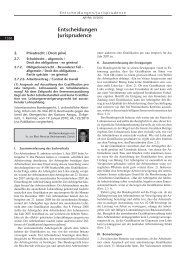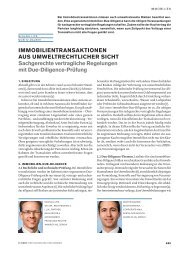ASAB 29-3 Thomas Rohner Michael Lazopoulos - Pestalozzi ...
ASAB 29-3 Thomas Rohner Michael Lazopoulos - Pestalozzi ...
ASAB 29-3 Thomas Rohner Michael Lazopoulos - Pestalozzi ...
You also want an ePaper? Increase the reach of your titles
YUMPU automatically turns print PDFs into web optimized ePapers that Google loves.
Respondent’s Refusal to Pay its Share of the<br />
Advance on Costs<br />
THOMAS ROHNER * , MICHAEL LAZOPOULOS **<br />
I. Advance on Costs in International Arbitration –<br />
Introduction<br />
In arbitration, unlike in most state court proceedings, the parties are<br />
usually requested to effect advance payments for the costs of the arbitration.<br />
The purpose of such advance payments is to cover the costs of the arbitration<br />
and to protect the arbitral tribunal against the parties’ later refusal to pay<br />
these costs, especially in cases of premature termination of the arbitral<br />
tribunal’s mandate. 1 If the parties fail to make the required advance payment,<br />
the arbitral tribunal generally suspends the arbitration or dismisses the case<br />
without prejudice. 2<br />
Most institutional arbitration rules provide that the claimant and the<br />
respondent are required to deposit an advance on costs for the arbitration in<br />
equal shares. 3 The advance on costs can be substantial depending on the amount<br />
in dispute. In practice, difficulties arise when the respondent refuses to pay its<br />
respective share of the advance on costs, be it to obstruct the proceedings, to<br />
force the claimant to finance the arbitration alone, or for other reasons. In such<br />
case, the claimant who wants to resort to arbitration will be invited by the<br />
arbitral tribunal or the arbitral institution (as the case may be) to pay the entire<br />
amount of the advance on costs. In this context, the question arises whether the<br />
claimant, who substituted the respondent’s share of the advance on costs, has<br />
any remedies to claim immediate reimbursement for the substituted advance on<br />
costs from the defaulting respondent. If so, under what conditions and in which<br />
form should the arbitral tribunal grant such request?<br />
This article will examine whether the arbitral tribunal has, upon request<br />
of the claimant who substituted the respondent’s share of the advance on costs,<br />
*<br />
**<br />
1<br />
2<br />
3<br />
Dr. <strong>Thomas</strong> <strong>Rohner</strong>, LL.M., is a partner with <strong>Pestalozzi</strong> in Zurich.<br />
Dr. <strong>Michael</strong> <strong>Lazopoulos</strong>, LL.M., MCIArb, is an associate with <strong>Pestalozzi</strong> in Zurich.<br />
KLAUS PETER BERGER, International Economic Arbitration, Deventer (1993), at 386.<br />
See, e.g., article 30(4) ICC Rules of Arbitration (“ICC Rules”).<br />
See, e.g., article 30(3) ICC Rules; article 41 Swiss Rules of International Arbitration (“Swiss Rules”);<br />
article 70(a) WIPO Arbitration Rules (“WIPO Rules”); article 45(3) SCC Arbitration Rules (“SCC<br />
Rules”); article 34(2) VIAC Rules of Arbitration (“VIAC Rules”); article 25 DIS Arbitration Rules<br />
(“DIS Rules”); article 41(1) UNCITRAL Arbitration Rules (“UNCITRAL Rules”); article 26.2 SIAC<br />
Arbitration Rules (“SIAC Rules”); article 42.1 ACICA Arbitration Rules (“ACICA Rules”).<br />
<strong>29</strong> ASA BULLETIN 3/2011 (SEPTEMBER) 549




